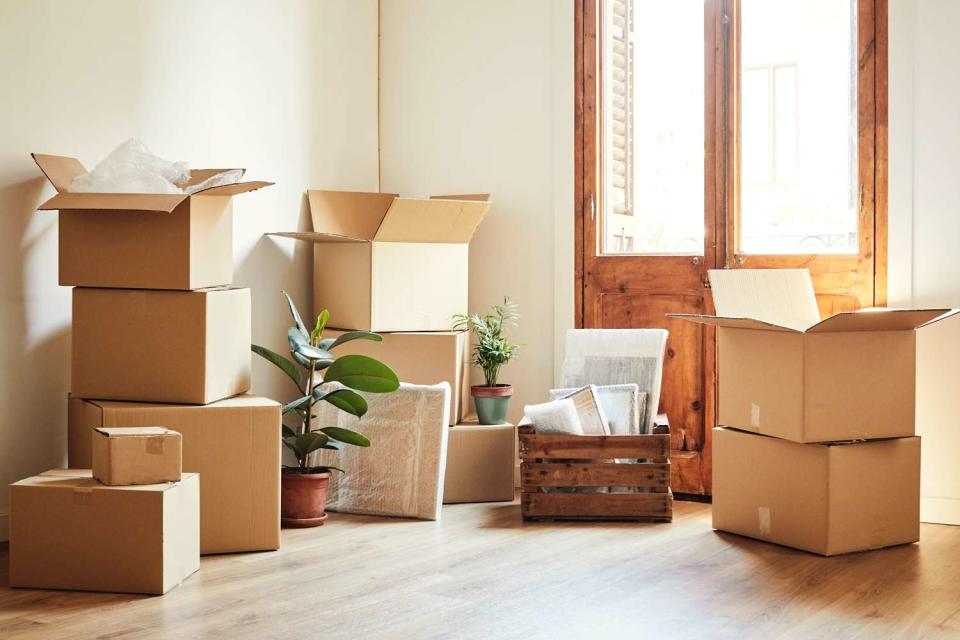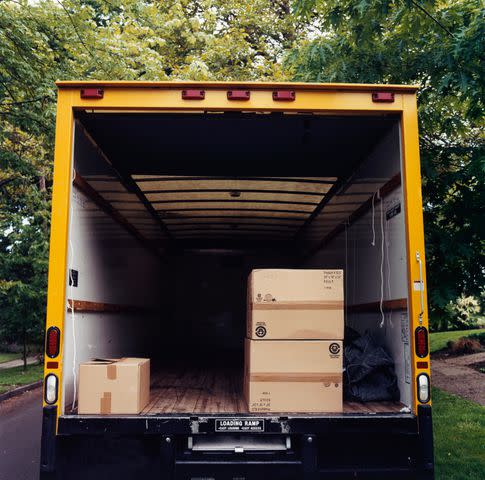11 Expert Tips for Moving Across the Country
Help your cross-country move go as smoothly as possible with these expert tips.

Morsa Images / Getty Images
Moving across town is one thing—moving across the country is another endeavor entirely. Before you spend thousands on tape, boxes, professional movers, and temporary housing, we have a few tips on how to help moving across the country go smoothly.
These experts suggest hiring professional movers, being strategic about what you take with you (regardless of whether you’re moving into a smaller home), and taking extra time to pack the right way so that setting up your new home is a breeze, among other things—read on for their top tips for moving across the country.
1. Plan Carefully
Perhaps it goes without saying, but no cross-country move is possible without a ton of planning. The more you plan, the better prepared you’ll be for the inevitable stress that comes with buying and selling in two places at once—and getting from one place to the other.
“Hope for the best and plan for the worst. It’s OK if everything doesn’t go to plan,” says Leslie-Anne Ball, a Realtor with Better Homes and Gardens Real Estate Paracle (The Carolinas). “[Take it] one day at a time and keep that end goal in sight.”
Planning begins with making choices about hiring movers.
“You need to decide on whether you will have movers, Pods, or you will be moving your belongings yourself,” says Lisa Lundt, a Realtor with Better Homes and Gardens Real Estate Universal in Las Vegas. “[Decide] how you’re going to get to your new home: fly or drive, and if driving, map your route and time expenditures. If arriving before closing, you’re going to want to make arrangements for a place to stay.”
As you plan for the best-case scenario, be prepared to pivot if plans change.
“For example, if the movers arrive a day late, and set aside some money for those contingency plans,” Ball says.
2. Sell, Sell, Sell
One way to cut both moving costs and unpacking time is to get rid of anything you don’t really need before you move.
“Sell excess furniture and belongings to save transportation costs,” says Patricia Martin, a Realtor with Better Homes and Gardens Real Estate Native American Group in Virginia Beach, Virginia. “You can buy replacements to fit your new location and your new home.”
If you have time, you can hold a garage sale, sell items on Craigslist or Facebook Marketplace, or donate to local thrift stores. You might even make some money that will help to buy new things or help pay for gas when you make the drive.
“Think carefully about letting go of material possessions like furniture, clothes, etc. before you leave,” says Stephen Herold, a partner associate with Better Homes and Gardens Real Estate Synergy in Flagler Beach, Florida. “The cost of the move literally could be better spent on decorating or new furniture, which would have been more appropriate for a new home.”
3. Keep Important Docs Handy
As you pack, be sure to set aside anything you’ll need during the move or immediately after to avoid having to search for it. You’ll especially want to keep any important documents at the ready.
“In case there are any hiccups at the closing, it’s helpful to have necessary documents and items accessible,” says Mike Bidwell, CEO of Neighborly, a resource for finding local home service experts. “Make sure such items are easy to find if packed, or keep them out during the move.”
4. Pack Clothing Strategically
When it comes to packing, clothing can take up a ton of space, but it can also be folded, rolled, and tucked away to maximize space.
“There will always be slight gaps between clothes,” says Alex Capozzolo, co-founder of Brotherly Love Real Estate. “You could use them to fit in small items such as socks or delicates that do not require a lot of space.”
Similar to packing a suitcase, you can also roll your clothing.
“Rolling clothes while packing is a space-saver,” Capozzolo says. “All you have to do is roll and then tuck the clothes into boxes.”
You can also use clothing and other soft items, such as bedding, to cushion delicate items in boxes as you pack, saving on packing materials.
:

Charles Gullung / Getty Images
5. Vet Your Movers
You’ll probably want to hire a professional crew to help move your items. In that case, spend time finding the best: You probably spent time looking for the right real estate agent and the perfect home, and it’s well-worth the time investment to do the same with movers.
“Make sure the moving company hears everything you are saying, and make sure they are trustworthy,” says Toni Anspaugh, a Realtor with Better Homes and Gardens Real Estate Big Hill in Delaware, Ohio. “Read reviews, and don't just go by the cost. Sometimes the little guy is worth it. Check everything out.”
Capozzolo says to look at companies that are licensed and insured.
“All professional moving companies based in the U.S. must have a license number issued by the U.S. Department of Transportation,” he says.
Even after reading reviews, you can ask companies for their references, Capozzolo says.
If you want to skip the search process, see if a friend or family member has a solid suggestion.
Once you’ve hired a crew, make sure they’ve looked over your inventory to offer an accurate quote. This can help avoid upcharges the day of the move. Review the estimate so you’re clear on possible fees. Some companies will charge to repack your items if you’ve done a bad job, or they’ll add charges based on weight.
“Choose a moving company that gives you a comfortable estimate and maintains transparency about additional charges,” Capozzolo says.
6. Label Your Boxes
Most people know that labeling a box makes it easier to unpack. Labeling that indicates which room each box belongs in gives movers direction when unloading, too. But you can take your strategic packing a step further with a few extra minutes.
“Another way to make the unpacking process easier is by making a list of things that are in each box and taping that list to the outside of the container to quickly find items later,” Bidwell says.
By spending more time preparing, you can potentially save hours of unpacking time—and save yourself from having to sort through boxes looking for essentials such as the TV remote or coffee maker in your new place.
7. Learn About the New Area
Preparing for your life in your new home is exciting, but it can also be stressful. Once you’ve chosen a new location, get to know the area before you arrive.
“Work with a great agent who is familiar with the area and will send lots of videos and insider tips,” Ball suggests. “Join the local Facebook groups for great local insights.”
Once you’re in town, new coworkers and neighbors will likely be eager to help with suggestions for the best grocery stores, parks, and restaurants.
8. Fit in a Road Trip
Even with professional movers, you’ll need to plan for the cross-country trip to get you and your household to your new home safely. One way to make this easier is to make the journey a road trip, rather than a break-neck race across the country.
“For those drivers making it a road trip, make sure to take your time and plan your stops,” says Nick Frade, a Realtor with Better Homes and Gardens Real Estate Paracle (The Carolinas). “Taking six days/five nights to complete the trek will give you about five hours of driving per day, leaving you refreshed and ready to load up and keep going the next day. This will also give you time to stop at an unplanned roadside attraction or two each day, if you like, and not ruin your overall timeline.”
You can even go so far as to book hotels along the route or plan to stay with friends.
If you’re traveling with a pet, look into methods of calming them on the road. Pack plenty of snacks and activities for children.
“Extra tip: Bring something that smells nice, like an air freshener spray,” Frade says. “Six days in a car can get a little stuffy. Having a nice scent to spray to calm your nerves and refresh the atmosphere will go far for your sanity.”
9. Change Your Address
Consider this your first bit of housekeeping. You can change your address as soon as the new property is yours. Start by forwarding your mail through the United States Postal Service.
“This is something you need to do with your bank, government agencies including the Department of Motor Vehicles and the IRS, your work, schools, and even online stores you frequently order from,” Bidwell says.
While you’re at it, you can look into changing your vehicle registration, updating your voter information, and even getting your dog registered and up to date on mandatory vaccines for the area.
10. Start with a Clean Space
Moving is stressful, and arriving at your new place is only the beginning of the settling-in process. To make things less stressful, treat yourself to a clean and inviting space from day one.
“Hire a professional cleaner if it’s in the budget,” Ball says. “Moving is exhausting, and having the new home cleaned is a wise treat.”
If you can, arrange for cleaners to come and go before you begin moving in. That way, you know you’re off to a fresh start in your new space (and there’s one less thing to do on moving day).
11. Unpack Your Bed First
Once you’re in your home, start by unpacking your bed so you have somewhere to crash at the end of a long day.
“The biggest moving advice that I've ever received and that I tell my clients is to get your bed set up first,” says Andrew Pasquella, a Realtor with Sotheby’s International Realty in Malibu, California. “Place the frame, get the mattress on, and get clean sheets on. Moving is hard and you'll be thankful to not have to make your bed at the last minute and get into a nice, clean, made bed.”
:
false

